- Home
- Roddy Doyle
Charlie Savage Page 7
Charlie Savage Read online
Page 7
But I always like it down there, regardless of the weather, and by the time I’ve put the shorts on and hosed the squashed strawberry seller off the front bumper, I’m a happy enough camper.
But there’s always something missing: the football.
It starts before the summer arrives – the grief. The last few matches of the season in late April and May are a bit like visits to the hospital to see a loved one who’s on the way out. Every final whistle is bringing you closer to the final whistle.
I wake up every Saturday knowing it’s Saturday – and it’s often the only thing I know. Who am I, where am I, what am I? These questions get answered later – quite quickly, in fact. By the time I’m on my way down the stairs to the kettle I generally know who and where I am. What I am has to wait till after the coffee.
But the one big thought is there from the start, before I’m fully conscious: football. And it’s been like that since I was a child. Saturday is football. I know, there’s football on Sundays too these days, and Mondays, Tuesdays, Wednesdays – every day of the week and every hour of the day. But Saturday is still the football day, even if your team is playing the day after. I worked most Saturdays when I was a young lad and I still loved waking up on Saturday.
I once woke up in a ditch in Wales – it’s a long story. I’d no idea where I was but I knew it was Saturday. It was raining, I’d no shoes or sterling – but I was still happy. I was out in the middle of nowhere, in a different jurisdiction, with a hangover that felt like most of the Second World War but I knew I’d make it to a radio in time for the final results. That was way more important than getting back to Ireland in time for the wedding – my wedding.
Anyway. There’s no football in the summer and it’s a struggle. I’m told that old people dread the winter. They haven’t a clue. I’m old now, myself – so the daughter says. You’re in the prime of your decline, Dad, and you should make the most of it; it’s a fabulous opportunity, like. The hardships of winter, the cold, the ice, the hypothermia, the darkness, the Late Late Show? Bring them on. It’s the summer that’s going to kill me.
I was watching a match a few weeks ago. I had the grandson, the daughter’s little lad, on my knee. I had the wife beside me. We had the dogs in front of us. I usually let them in for the live games because they bark at the referee and it’s always – always – a laugh.
The grandson’s barely three but he already loves his football. I have him well trained. When the camera homes in on a Man United player he looks up at me.
–B’illi’nt? (That’s ‘brilliant’ to you and me.)
–Yes, love, I say.
Any other player – anyone dressed in blue, black, stripes or that strange shade of pink worn by Liverpool, he looks up again.
–Hobs’ite? (That’s ‘gobshite’, by the way.)
–Yes, love.
It’s wonderful – it’s almost miraculous, witnessing the child’s development, particularly his flair for language. And there’s a moment I’ll never forget. One of the United players, Marouane Fellaini, has just been sent off for head-butting an opponent. It’s shocking – even the dogs have shut up. Fellaini’s face – Who, me? – fills the screen.
The little lad tugs at my trouser leg.
–Hobs’ite? he asks.
I’m stunned. Like the dogs, I’m speechless.
He’s just asked me to confirm that one of his own players is a gobshite. He’s become – right there on my knee – a true football man. In the company of his grandad and his nanny – a football woman – and the dogs.
This is domestic bliss. This is why I live.
And this is what I lose in the summer.
24
I’m under attack from both flanks, in one of those pincer movements that were very popular during the Second World War.
It’s probably not fair to refer to my wife and daughter as ‘flanks’ and, strictly speaking, I’m not under attack at all. But I still feel that my whole way of life – or, more accurately, my lack of a way of life – is under threat. I’m determined to resist but I know I’ll give in. My days are numbered.
It’s my own fault. I should never have said it. Here’s what I said:
–I’ve nothing to do.
It’s not so much that I said it. It’s more how I said it, the context. I walked into the kitchen and—
–I’ve nothing to do, I said.
I wasn’t answering a question or taking part in a conversation about the meaning of life. It just popped, as they say, out.
–I’ve nothing to do.
–You could cut the grass, said the wife, but she was being sarcastic. We don’t have any grass – the dogs have seen to that. The back garden no longer exists. Where there used to be grass and flowers, an apple tree and a trampoline, there is now a collection of holes in the ground – and shite. There isn’t a blade of grass or the remains of a hedge out there. I think they even ate the trampoline.
Anyway. The wife looks at me and she must see something. I haven’t a clue what it might be because my facial expression hasn’t changed since October 1998 – or so I’m told.
Anyway, she suddenly looks concerned. It’s not the look a virile man wants to see on the face of the woman standing in front of him. Give me anger any day – or even bafflement. But the Princess Diana ‘Battered This, Battered That’ mush? I just want to go outside and dig a new hole with the dogs.
Anyway.
–Charlie, she says. –What’s wrong?
–Ah, nothing, I say.
My second mistake. I should just have said, ‘Nothing’. But I said, ‘Ah, nothing.’ And the ‘Ah’ in front of ‘nothing’ changes the meaning of the word, completely. ‘Nothing’ becomes ‘something’, ‘a lot’, ‘everything’. I might as well have told her, ‘My life is falling apart at the seams’ – or where there used to be seams. Her facial expression: she looks like a very attractive mother superior gazing at a leper.
And the daughter walks in.
–What’s wrong?
I can’t tell them the truth. Which is simple – but dare not speak its name.
I can’t go to the pub.
Not since my pal, the Secret Woman, got off with my old girlfriend, Eileen Pidgeon, in a café in Greystones while I was out in the jacks. I’m ready to forgive the man – he was probably doing me some kind of an accidental favour. But I’m afraid – terrified – I’ll find Eileen sitting on my stool, her arse parked where my arse should be, up at the bar, to the left of the Guinness tap.
I can’t tell them – the wife and the daughter – that the local is out of bounds. I could, but then I’d have to tell them that I’d had a row with my pal. And one of them or both of them would ask, ‘What about?’, and I can hear myself saying it again – ‘Ah, nothing’.
I love them both dearly – so, so, so much – but the KGB and the Gestapo had nothing on the women in my life when it comes to extracting information. Torture isn’t necessary, not even the threat of it. They just have to look at me. They don’t even have to look; I just have to know they’re going to.
So I tell a lie.
–There’s no football on.
It’s not really a lie – or not a whopper, anyway. There actually isn’t any football on. The season’s over and the summer yawns in front of me. Tennis, cricket, the GAA, fresh air, good cheer, bronzed bodies – I hate every minute of it. I pine for the dark of winter and the off-side trap.
But the lack of football isn’t why I’m moping around the house just now, when the sun is sliding behind the back wall and I should be thinking about migrating to the pub. But I can’t tell them the truth: I’m scared Eileen Pidgeon will be there. The questions, the consequences, the absurdity – I couldn’t cope; western democracy couldn’t cope. It’s my duty to lie.
–There’s no football on.
And it works.
Kind of.
–Ah, for Christ’s sake – Charlie! I thought you had cancer!
–Ah, Dad – get a grip, like.<
br />
The wife’s forgotten that a few minutes ago I looked like mankind on the brink of extinction. Now, she’s just looking at an eejit, an elderly brat. The daughter, however, is looking at a project.
And I’m doomed.
25
I’ve never been a lazy man. I worked hard all my life, when I had to. I played a vigorous game of football until I didn’t want to – when I was thirty-four. I wasn’t very good but no one else was either, except for one chap who went on to nearly play for Bohs. I gave it my all – or most of my all – until I realised that the little bastard running past me was sixteen years younger than me and didn’t have five kids. So, the next time he was in my vicinity – about half an hour later – I gave him a kick, got sent off, told the ref he was only a Cabra bollix, and hung up my boots, in that order.
My point is: I’m not lazy but I’m realistic. If something needs doing I’ll do it. But I’m the one who’ll decide if it needs doing. Unless it’s the wife or the daughter who decide; then I’ll hop to it and do exactly what I’m told. After the futile, token resistance.
–You could do with a haircut, Dad.
–My hair’s grand – leave it alone.
–You look like that mad fella – Einstein, like.
–Einstein was a genius, I tell her. –I’m just happy to have hair.
–But that’s the point, like, she says. –You should be using it to your advantage but I look at you, Dad, and I see a man who’s being bullied by his hair.
I’ve no idea what she’s talking about. But I trot down to the barber. It’s either that or she’ll do the job herself and I’ll end up looking like a boy-band member who’s been lost in his dressing room for the last fifty years.
I bring some of the dogs for the occasional walk, around the block or sometimes as far as the shopping centre, where I let them piss against the window of Insomnia, and come home. It’s a small act of revenge: about three years ago, a young lad behind the counter raised his eyes to heaven when I asked him for ‘a plain black coffee with no messing’. He’s long gone but the dogs are so well trained, they piss at the sight of the Insomnia logo, so I can’t stop them.
Anyway, somehow or other the walk became some sort of a scientific experiment. The daughter times me, to the nanosecond, and even factors in the age, weight and number of the dogs that are dragging me down the road. It’s my health she’s looking after but she’s murdering the dogs.
Moving on.
I’m no stranger to the inside of the dishwasher, and the washing machine actually hums when it sees me approaching; we’ve become quite close over the years. I do my fair share, is what I’m saying. And the wife wouldn’t disagree with me. The daughter has grown up eating grub I’ve cooked and wearing clothes I’ve shrunk. If there can be gods that are just fair enough, then I’m a domestic god.
So I know – and they know: they’re not at me because they think I’m useless. When I walked into the kitchen a week ago and complained – well, whinged – that I’d nothing to do, the wife was exasperated. She’s reared her kids and she doesn’t want to start all over again, rearing a cranky, elderly infant. There’s already one of them in charge of the free world, so she doesn’t want another one in the house, in charge of the dishes.
But she wasn’t just being impatient. She was worried.
And so is the daughter.
They don’t like seeing me getting older. I don’t see it, because I don’t have to look at myself that often and I’ve started taking my glasses off whenever I’m near the bathroom mirror.
Anyway, when I see them looking at me, and at each other, and back at me, I know they’re going to force me back into the tracksuit I’d shoved under the bed, and make me climb mountains and eat vegetables I can’t pronounce.
But I’m wrong.
They say nothing. They retreat. They leave me alone in the kitchen – with nothing to do.
One thing I don’t really notice at the time: the daughter turns on the radio as she’s walking out.
And I shout at it – the radio.
Not immediately. But a few minutes later when the news comes on and there’s some eejit going on about Enda Kenny’s legacy.
And I shout.
–What legacy, you gobshite?
And they’re back in the room – the wife and daughter, but especially the daughter, if that makes sense.
She turns off the radio.
–Dad, she says.
–What?
–You’re going to have to do more than just keep calling the radio a gobshite, like.
She has the look in the eyes: you are my project.
–You’re going to become a social influencer, she says.
26
I’m standing in the kitchen.
The wife and the daughter are with me.
There are ‘warm’ smiles and ‘happy’ and ‘affectionate’ and ‘winning’ smiles – but can a smile ever be described as ‘determined’? I ask, because they’re smiling at me but their eyes are doing something else entirely. They look a bit like a pair of aliens who’ve been taught how to smile but they haven’t quite mastered it yet. The upturned mouths tell me they’ve come in peace but the eyes tell a different story: they are here to take over my world.
I’ve been half-expecting this. Now, I don’t actually think the wife and the daughter are aliens. What’s the name of that book I saw in the wife’s sister’s house once? Men Are from Mars, Women Are from Venus. Well, the wife’s from Coolock and it’s only a mile up the road.
No, what I’ve been anticipating is another campaign to get me to change my lifestyle. I’ve been expecting exercise regimes and dietary demands. They’ve tried it before and I find that the best policy has always been to go along with it until they forget.
But this time it’s different. It’s not about broccoli or body fat. The daughter has just told me that I’m going to become a social influencer. I don’t know what that means but it doesn’t matter; the words – ‘social’ and ‘influencer’ – grab my heart like two hands, and squeeze. The answer to the question, ‘What in the name of Jaysis is a social influencer?’, will more than likely kill me.
And it’s my own fault.
The radio was the bait. The daughter had turned it on when she was walking out of the kitchen. She knew I’d shout at it, and I didn’t let her down. I come from a long tradition of men who shout at the wireless. It works for telly as well, but the newer media – phones, iPads and what have you – are all useless. Show me a man who shouts at his phone – at, not into – and I’ll show you a nitwit. But one who shouts at the radio? You’re looking at a man at ease with his masculinity.
It was my father who taught me how to shout.
–Is he a gobshite, Da?
We were listening to Mícheál O’Hehir criticising the Dubs.
–He is, son – let him have it.
–Gobshite!
–Good man. How did that feel?
–Brilliant.
He taught me when to shout and when to wait, when to stare at the wireless with incredulity and when – and how – to stride across the room and turn it off. And, just the once, he even showed me how to throw it out the window. He shouted at the wireless, even when there was nothing on. My mother asked him why and he answered, ‘I know what they’re thinking.’
Anyway. My father grew up shouting at De Valera and Churchill – a golden age of shouting. But I shout at everyone – politicians, most football pundits, at virtually everyone on between the hours of nine and midday, and at the bells of the Angelus, all eighteen of them.
–Bong, yourself!
And this, the daughter tells me, makes me qualified to become a social influencer.
I look it up – I google it – I slip on the reading glasses when she’s not looking. A social influencer is someone whose opinions carry more weight with their colleagues and the general public than is the case with most individuals.
It’s drivel, but I’m flattered.
Soc
ial influencers establish large followings on social media such as Facebook and Twitter and are widely considered authorities among their followers.
Oh, Jesus.
She has the wrong man.
I know my mistake. I’ve been shouting too often, and at too many. I’ve been shouting at chefs and consultants and style gurus – and everyone. When I roared, ‘What would you know?’ I never meant to suggest – not for a minute – that I knew. I’d shout at myself if I heard me on the radio.
I know: they – the wife and daughter – have been worried about me. I went to the GP a few weeks back. He took my blood pressure and told me I was grand but I needed an interest. And I made the mistake of telling them.
And now, apparently, I have one. I’m a social influencer and, unknown to myself, I have been for the past week.
The daughter holds up her iPad and shows me the Facebook page she’s designed for me: The Shouter. She points at a number.
–You have eighty-seven followers, like.
She shows me a video. It’s me – I’m standing in front of the radio. I’ve just heard Leo Varadkar saying that he represents the people who get up early in the morning.
And I shout.
–That’s it, so! I’m staying in bed till the next fuckin’ election!
She points at the number.
I have ninety-one followers.
27
Being Ireland’s foremost elderly social influencer is a full-time job.
It’s all go, from the minute I wake up – earlier than you, Varadkar – to that dog-tired decision at the end of the day, ‘Will I bother with my teeth or just brush them really, really hard in the morning?’ There isn’t a moment in the day that isn’t a potential opportunity.
Or so I’m told.
By the daughter.
She has me shouting at everything.
–I’m supposed to be retired, love, I tell her.
–That doesn’t mean your brain’s retired, Dad, she says.
She’s right, of course. But I wish my mouth was – retired, that is. Or even working part-time. When the doctor said he thought I needed an interest, I think he had stamp collecting in mind, or hill walking, or having a go at the garden. I don’t think he expected me to go home and start shouting at the radio, live on Facebook.

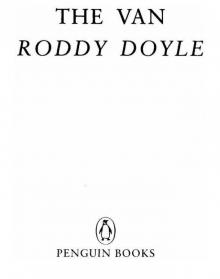 The Van
The Van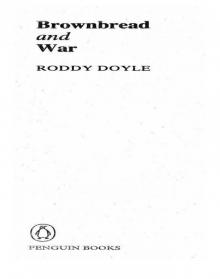 Brownbread & War
Brownbread & War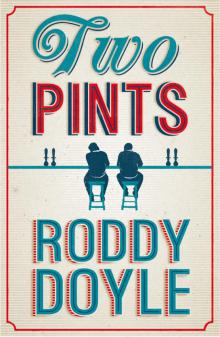 Two Pints: A Collection
Two Pints: A Collection Rover and the Big Fat Baby (Giggler 4)
Rover and the Big Fat Baby (Giggler 4)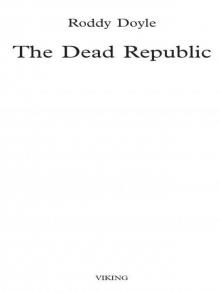 The Dead Republic
The Dead Republic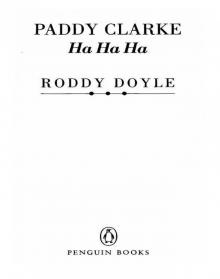 Paddy Clarke Ha Ha Ha
Paddy Clarke Ha Ha Ha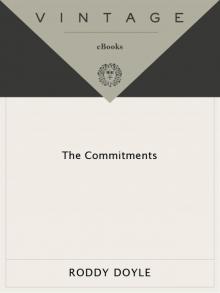 The Commitments
The Commitments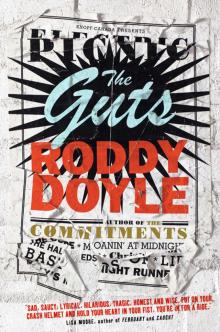 The Guts
The Guts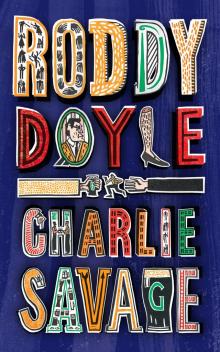 Charlie Savage
Charlie Savage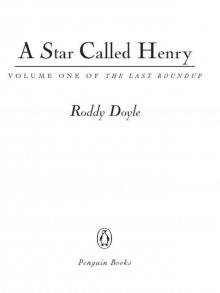 A Star Called Henry
A Star Called Henry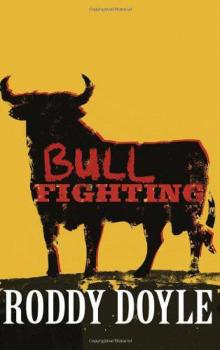 Bullfighting: Stories
Bullfighting: Stories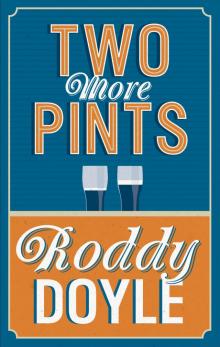 Two More Pints
Two More Pints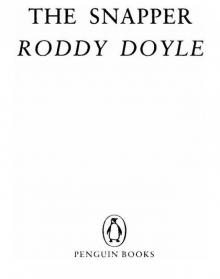 The Snapper
The Snapper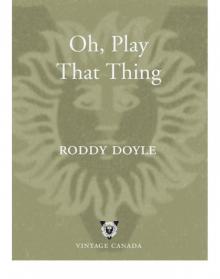 Oh, Play That Thing
Oh, Play That Thing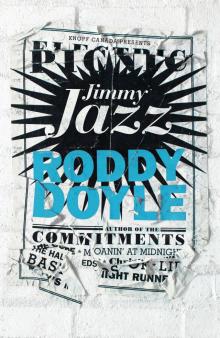 Jimmy Jazz
Jimmy Jazz Paula Spencer
Paula Spencer Wilderness
Wilderness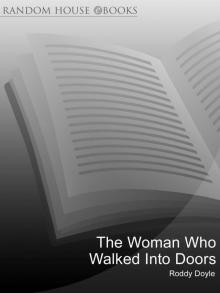 The Woman Who Walked Into Doors
The Woman Who Walked Into Doors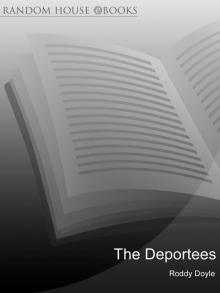 The Deportees
The Deportees Rover and the Big Fat Baby
Rover and the Big Fat Baby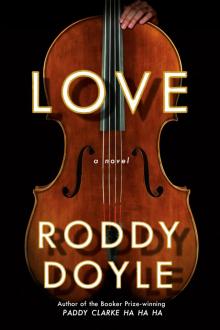 Love
Love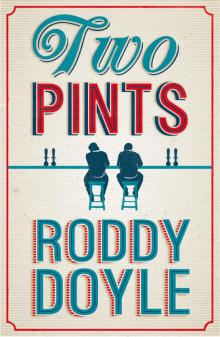 Two Pints
Two Pints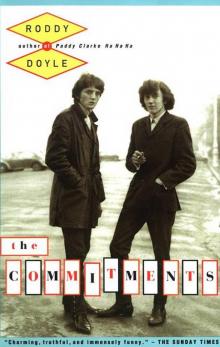 The Commitments b-1
The Commitments b-1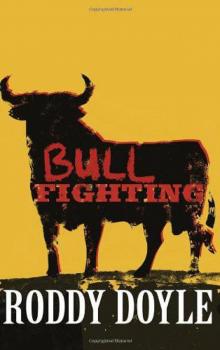 Bullfighting
Bullfighting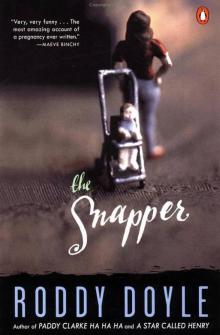 The Snapper b-2
The Snapper b-2